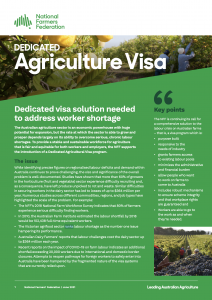The National Farmers’ Federation supports the introduction of a dedicated Agriculture Visa
The Australian agriculture sector is an economic powerhouse with huge potential for expansion, but the rate at which the sector is able to grow and prosper depends largely on its ability to overcome serious, chronic labour shortages.
To provide a stable and sustainable workforce for agriculture that is fair and equitable for both workers and employers, the NFF supports the introduction of a Dedicated Agricultural Visa program.
To read more about the NFF’s position on a Dedicated Agriculture Visa (Ag Visa), click here:
Studies have shown over 60% of growers in the horticulture (fruit and vegetable) sector experience difficulty recruiting and, as a consequence, have left produce unpicked to rot and waste. Similar difficulties in securing workers in the dairy sector has led to losses of up to $364 million per year. Numerous studies across different commodities, regions, and job types have highlighted the scale of the problem.
The consequence of failing to implement an appropriate visa solution is that the supply of food and fibre products produced by Australian farms will be constricted and prices for everyday Australians will go up.
Principles for a dedicated Agriculture Visa
The NFF’s proposal for an agricultural visa is built around five core principles:
Workers should be able to move from job to job (provided they remain working in agriculture) as and when they’re needed. In addition to giving both worker and employer flexibility, this would minimise opportunities for abuses.
Perhaps most critically, workers could only be hired
by farms that have demonstrated fair employment practices. To this end, the visa would feature an employer approval or registration system which confirms they are ’fit and proper’.
The visa would allow entry for a short term (up to 9 months) with a multiple entry component, and the option for the worker to return to Australia year-on-year.
Currently both unskilled and skilled visa arrangements are effectively uncapped but in order to hire a migrant worker, employers must conduct ‘labour market testing’. The dedicated agricultural visa would abandon this process as inconsistent with the seasonal requirements of farm work.
There should be additional mechanisms to ensure the entrant complies with visa restrictions while in Australia, and that they departs when the visa expires.






Add comment